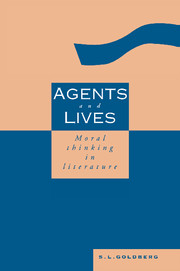Book contents
- Frontmatter
- Contents
- Acknowledgments
- Preface
- 1 ‘Perpetually moralists’ … ‘in a large sense’
- 2 ‘How to live’ and ‘how to live’
- 3 Agents and lives: making moral sense of people
- 4 ‘Doing good to others’: some reflections on Daniel Deronda
- 5 Moral thinking in The Mill on the Floss
- 6 Finding congenial matter: Pope and the art of life
- 7 Literary judgment: making moral sense of poems
- 8 Afterword: some limits of philosophy?
- Notes
- Index
5 - Moral thinking in The Mill on the Floss
Published online by Cambridge University Press: 19 January 2010
- Frontmatter
- Contents
- Acknowledgments
- Preface
- 1 ‘Perpetually moralists’ … ‘in a large sense’
- 2 ‘How to live’ and ‘how to live’
- 3 Agents and lives: making moral sense of people
- 4 ‘Doing good to others’: some reflections on Daniel Deronda
- 5 Moral thinking in The Mill on the Floss
- 6 Finding congenial matter: Pope and the art of life
- 7 Literary judgment: making moral sense of poems
- 8 Afterword: some limits of philosophy?
- Notes
- Index
Summary
Who but a philosopher would think it was praising poetry to call it more philosophical than history?
Poetry … tends to express the universal, history the particular. By the universal I mean how a person of a certain type will on occasion speak or act, according to the law of probability or necessity; and it is this universality at which poetry aims … The particular is – for example – what Alcibiades did or suffered …
(Poetics, translated by Butcher, 145 Ib)Aristotle's observation is true enough, no doubt, as far as it goes. But what it expresses, surely, is how a person of a certain type will probably or necessarily speak about poetry. The philosophical type of man will tend to see poetry as exemplifying recognizable universals – for example, those of moral psychology; and he will naturally value it for this because he is the type of man for whom the recognizably universal – types, categories, principles, universally valid reasons, rules, ideals and laws – is always more basic, more important, than the particular, the contingent, the distinctively individual, the unique: even in matters of moral insight and wisdom. That indeed is one of the reasons we would call him a philosophical type of man.
Of course, to say this is to express just such a moralpsychological judgment oneself. Nor can we avoid making such judgments. Being occasionally reflective and partly rational, all human beings may be partly or occasionally philosophers.
- Type
- Chapter
- Information
- Agents and Lives , pp. 150 - 185Publisher: Cambridge University PressPrint publication year: 1993



